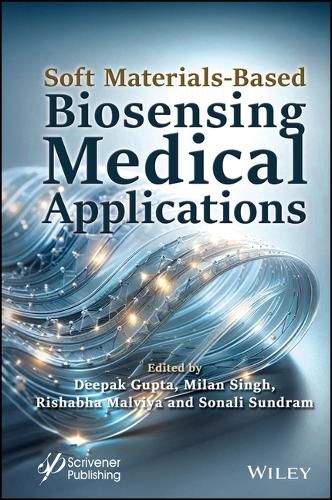Readings Newsletter
Become a Readings Member to make your shopping experience even easier.
Sign in or sign up for free!
You’re not far away from qualifying for FREE standard shipping within Australia
You’ve qualified for FREE standard shipping within Australia
The cart is loading…






The book offers a comprehensive, interdisciplinary overview of how innovative soft materials are revolutionizing biosensing technologies, making it an essential read for anyone interested in cutting-edge advancements in biomedical research and healthcare.
Soft materials include granular materials, foams, gels, polymers, surfactants, functional organics, and biological molecules. These structures can be altered by thermal or mechanical stress due to their ability to self-organize into mesoscopic physical structures. They are becoming increasingly significant as functional materials for broader applications because of their rich surface chemistry and versatile functions.
A biosensor is an analytical tool for chemical compound detection that combines a biological element with a physicochemical detector. Sensitive biological components, such as proteins, carbohydrates, tissue, bacteria, and enzymes, are collected from a biomimetic element that interacts and binds with the analyte under investigation. In biosensors, soft matter may function as both a sensing and transducing component. The interplay of soft matter with biomolecular analytes results in cell signaling pathways, diagnostic tests for applications in low-resource environments, prospective drug development, molecular biodetection, chemical sensors, and biological sensors. Understanding these biomolecular interactions in the context of acute illnesses is critical for biomedical research and healthcare. This has fueled efforts to create a biosensor that is effective, low-cost, and label-free.
Several approaches using soft materials to functionalize and tailor structures have greatly advanced science, including chemistry, physics, pharmaceutical science, materials science, and engineering. Soft Materials-Based Biosensing Medical Applications summarizes recent advances in soft materials with unique physicochemical properties that synergistically promote biosensing systems.
Audience
The book will be read by researchers, materials scientists, electronic and AI engineers, as well as pharmaceutical and biomedical professionals interested in the uses of biosensing.
$9.00 standard shipping within Australia
FREE standard shipping within Australia for orders over $100.00
Express & International shipping calculated at checkout
The book offers a comprehensive, interdisciplinary overview of how innovative soft materials are revolutionizing biosensing technologies, making it an essential read for anyone interested in cutting-edge advancements in biomedical research and healthcare.
Soft materials include granular materials, foams, gels, polymers, surfactants, functional organics, and biological molecules. These structures can be altered by thermal or mechanical stress due to their ability to self-organize into mesoscopic physical structures. They are becoming increasingly significant as functional materials for broader applications because of their rich surface chemistry and versatile functions.
A biosensor is an analytical tool for chemical compound detection that combines a biological element with a physicochemical detector. Sensitive biological components, such as proteins, carbohydrates, tissue, bacteria, and enzymes, are collected from a biomimetic element that interacts and binds with the analyte under investigation. In biosensors, soft matter may function as both a sensing and transducing component. The interplay of soft matter with biomolecular analytes results in cell signaling pathways, diagnostic tests for applications in low-resource environments, prospective drug development, molecular biodetection, chemical sensors, and biological sensors. Understanding these biomolecular interactions in the context of acute illnesses is critical for biomedical research and healthcare. This has fueled efforts to create a biosensor that is effective, low-cost, and label-free.
Several approaches using soft materials to functionalize and tailor structures have greatly advanced science, including chemistry, physics, pharmaceutical science, materials science, and engineering. Soft Materials-Based Biosensing Medical Applications summarizes recent advances in soft materials with unique physicochemical properties that synergistically promote biosensing systems.
Audience
The book will be read by researchers, materials scientists, electronic and AI engineers, as well as pharmaceutical and biomedical professionals interested in the uses of biosensing.